Limbo

Limbo popped up in the news in 2006, if I recall correctly they had secured funding from danish authorities based on some concepts and were looking for developers. After that they pretty much went silent and it was easy to assume they never got anywhere for one reason or the other. When looking at indie game marketing it is easy to assume a non-transparent development process is a nonexistent one, although Phil Fish has some interesting points on the subject.
Anyhow, the game. Belonging to the puzzle-platformer genre it is hard not to compare Limbo to Braid in Particular. While Jonathan Blow was far along with the game design before David Hellman started working on the art of Braid, Limbo seems to have been developed around the visuals. Many puzzles rely on items being hidden in the background and the mechanics feel slightly less polished than Braid – a lot of the puzzles are physics-based and and rely on momentum, and as margins are fairly low it is sometimes hard to know if you are using an incorrect solution or simply are too slow.
Such occasions are rarely annoying for very long, though, and the game is beautiful and dark in a way few others in the genre dare to be. The years spent on this project certainly shows and it is well worth the time it takes to complete.
Final Fantasy XIII
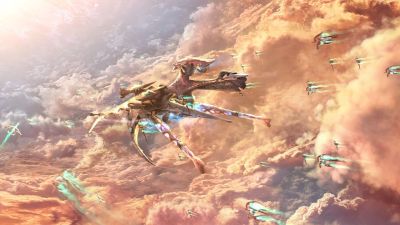
I like Final Fantasy a lot more than I should, but after the Persona IV experience I am starting to suspect it has something to do with the work-reward balance and the time it demands. The amount of effort you need to put in to actually accomplish something is bigger than shorter games, and it is not afraid to tell you you have failed – meaning the feeling of accomplishment when you cross hurdles is greater. Also, the simple fact that you spend more time playing this game means the mere familiarity of it will make it appealing.
In terms of how it compares to the other games in the series, FFXIII is a very linear experience where what exploration exists is more or less confined to a single chapter and separated from the overall story and rest of the game. It is a bit sad since you do not have the freedom to change pace and do something else if you want to anymore, but I guess after the very open last iteration some experimentation with a more Xenosaga-like progression was in order.
The battle system is what usually changes a lot between Final Fantasies though. FFXIII offers a mix between the somewhat revolutionary system of FFXII and the more traditional ATB systems, having well defined encounters but letting players focus solely on overall strategy instead of micromanaging commands. This leads to a faster, almost real-time battle system that actually functions to make the most of the IP, for once I actually used all of those status-enhancing spells to a meaningful degree. FFXIII has also removed most of the internal economy, no stats – not even health – are kept between battles so each fight is a new start. Dying will not set you back more than to just before the fight, which is a pleasant surprise considering the strict adherence japanese game developers usually have to old design ideas.
I like these changes as they remove a lot of the tedium and let you focus on the overall flow of the game, but it is a bit weird to see SquareEnix removing so much from the game. Less is more to be sure, but minimalism taken far enough will ultimately remove the game altogether. Maybe they consider the narrative and art styles to be the core of the game, and FFXIII offers nothing new in this regard – all of the character archetypes are there, so are the mysterious demigods and all of the sentimental monologues about how everything can be accomplished as long as you believe… But maybe I am just too old to appreciate it. Graphically it is kind of a letdown, the design is decent and the prerendered cutscenes are stellar, but technically it is not very impressive – looks more like a hi-res PS2 game than one from this generation. Not ugly, but you expect at least some technical marvels from games of this caliber.
Of the main Final Fantasy series, all of the games have a personal meaning to me – a connection to the place I was in my life when I played them, in a sense. It is going to be interesting to see where I will be when FFXIV is released, and if I will even have time to play it.
Ratchet & Clank: A Crack in Time
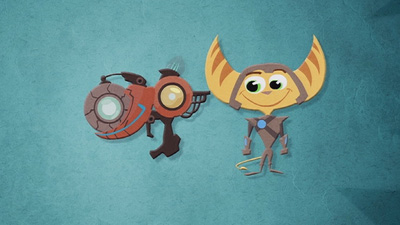
Ratchet and Clank is a very refined game on many levels. It is technically complex and has a clean and consistent art-style that harmonizes with the engine, and it is very balanced design-wise. The game has just the right amount of variety and levels are remarkably free from annoying areas. The trademark set of wacky weapons arguably makes for a little too many different powerups, but as what kind of pickups you get rarely matter a lot I do not consider this an issue.
Gameplay is more reminiscent of Mario Galaxy in terms of progression and sidequests than was Ratchet and Clank Future. This makes sense seeing as the design of Ratchet and Clank is a lot more character progression and story-driven than the very platform-driven Mario series… Although it does place more responsibility in the player of how much of the game you want to experience than a linear set of levels, which I guess can be annoying.
A Crack in Time has some issues to be sure, the checkpoint placement is sometimes uneven, some puzzle segments drag on for a bit too long and some of the minigames feel a lot less polished than the main platform game. It also does not have the perfect platform game camera, but then again nobody has done that yet… It cannot be argued that it is not a very solid platform game, though.
It occurs to me that I have said basically the same thing about all of the games I played during my vacation so far, which seems kind of pointless; I should probably try and elaborate more on what constitutes quality in the individual games instead of rambling about them not being perfect but having the core mechanics down. I will have to think about that next time…
Lost Planet 2
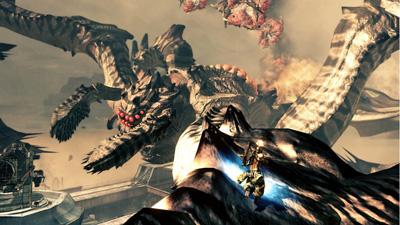
Lost Planet 2 is made to be a co-op game, and even though it does give you the opportunity to replace friends with AI companions I get the feeling that this is not really the experience the developers had in mind so I will not say much about it. The multiplayer focus means it lacks most of the story and characters and some of the level ingenuity the first Lost Planet had, so it would not be a fair comparison.
Other than that, Lost Planet 2 has it’s fair share of issues. The AI is downright horrible, a lot of the time they just stand around waiting for something to happen. The visuals are nice, but far from eye-popping. The levels are often incredibly linear in terms of where you can go and how you can deal with obstacles, at other times finding out what to do is very hard. Weapon placement is uneven and like so many other third-person action games it has too sluggish movement to do precision jumping but still penalizes the player heavily for failing platform challenges. Lost Planet 1 had some of these as well.
I do still like the game, though, as most of these deficiencies can be chalked up to the game being sort of an arcade experience where the focus lies in providing shooting mayhem. It is not perfect, but traveling on foot or in mechs and using a myriad of weapons to fight everything from hordes of small critters to huge monsters is fun. Maybe I should place more sophisticated demands on my entertainment and perhaps this is what reviewers have done since both games have received lackluster reviews, but when enjoying myself I find it difficult to write down a game because it hasn’t kept up with all of the latest design trends.
God of War III
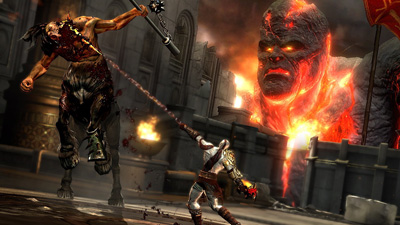
The first God of War was released rather anonymously some five years ago, and quickly grew into a phenomenon. The second and now third iterations have been very careful not too introduce too many elements that might clash with the basics, and God of War III is a very similar game as it’s predecessors.
It was said that they wanted to raise the bar again and sure enough it is raised – in terms of visuals and scope of the narrative. Gameplay- wise the weapon and ability system has been changed to become more streamlined and a series of tunnel sequences have been added, but other than that it is just like God of War 2. And sure, I liked the first two God of War games, but it seemed to me that certain things were prime candidates for overhaul. For instance, the constant platforming challenges are a bit too complex for the precision of the engine and instant death when missing a jump felt unfair more than one time – it certainly doesn’t help that the game offers to lower the difficulty level when that is not going to help you with anything but the battles. Also, this being the end of a trilogy Kratos has some character development as he nears the end, a noble effort but sadly the result feels rather contrived.
I guess the important part of any God of War game would be the battles, though, and those certainly delivered so complaining about other things is just nitpicking. Different weapons offer very different fighting styles and overall it feels very brutal and violent but with controls that make it precise and elegant. On the other hand, the earlier games had this as well, so the question becomes how much a sequel really needs to add to be validated? Can we accept that even iconic games devolve into vessels for delivering narrative where nothing else really changes? I will have to consider this some more.
No More Sweden 2010
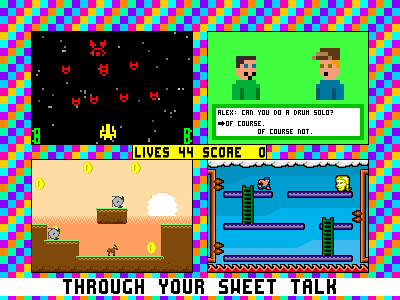
No More Sweden occurred again, this year in the town of Skövde. Less places to go to, but easier to get around and a – thankfully – air-conditioned locale. I did make a game, but it wasn’t very good… And not in a “I had a cool idea but it didn’t work out” – way, rather a “I did something completely uninspired just to do something” – way. Anyhow, I’m not going to post it so the above picture is from Daniel Remar’s brilliant entry Man Enough. Hopefully the game and the soundtrack will be available within the next few days.
The organizers have stated that they want this to be more of a gathering than a jam though, and it is definitely moving in the right direction. Lots of interesting presentations were held on different topics and a lot of time was spent just relaxing in discussion and trading stories. Coming straight from an increasingly commercial mainstream games industry, it is a true breath of fresh air to meet people who think that games can be something more, do something new and mean something else – and people who also are not afraid to try it out.
The “Games as Art” Meta-argument
Roger Ebert has written another piece in the “Games as Art” – debate, admitting he might have been wrong to enter the debate in the first place. The first paragraph sums it up quite well;
“I was a fool for mentioning video games in the first place. I would never express an opinion on a movie I hadn’t seen. Yet I declared as an axiom that video games can never be Art. I still believe this, but I should never have said so. Some opinions are best kept to yourself.“
Reading the entire thing provokes some thought about why the “games as art” – argument is in the state that it is. Ebert was criticized for saying that games can never be art without defining what art actually was, he then admits to failing in trying to find a definition for art that would both satisfy him and include all of what is generally considered art.
Ebert also says that he is not interested in playing games to find out if there is indeed something there to fit his definition of art, and is thus prepared to agree that there might be and it is not for him to deny it. In a sense, returning to his former conclusions the concept of “art” seems more personal than what he might have originally thought, and as such one who actually enjoys games to a great degree might with them have a similar experience to what Ebert has when he enjoys what he calls art. Maybe art has so much to do with your own emotions that you are unfit to judge the artistic value of a medium you do not like.
Sure, what essentially boils down to “everyone has their own opinions” is not really a groundbreaking conclusion, but reaching that conclusion in an uncommonly rational way is a refreshingly clear contribution to a muddy debate.